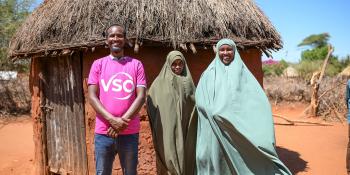This photo diary of a day in the life of a remote hospital in north-east Ethiopia reveals how VSO-trained nurses and midwives are fighting to save lives.
8am
Volunteer Sarika begins her shift by signing in at the Neonatal Intensive Care Unit (NICU) that has been set up by VSO. She takes over from the nurse who has been working the night shift – there are only three nurses to cover a whole week of round-the-clock care that the sick and premature babies in this unit urgently need. Sarika is using her placement to train some new nurses here in specialist newborn care to help cover critical gaps.
8.15am
"The day has barely begun when our first urgent case comes in – a tiny premature boy. We don’t know exactly how old he is – many pregnant mothers don’t get antenatal checks – but his mum estimates she was pregnant just seven months when she gave birth at a rural health centre 15km up the mountain. In rural Ethiopia, that would usually be considered a miscarriage – most units can’t do anything for a baby as small as this. But miraculously, the little boy still has a heartbeat and this unit at least has the equipment to try and save his life."
8.22am
"The little boy – who I learn is named Tarek – was icy cold to the touch when he arrived. We’re using a radiant warmer to try to increase his temperature to the 37°C needed for survival. It takes about a minute to raise temperature just one degree. To speed the process, we’re using plastic bags to insulate his tiny body. Every second counts."
8.45am
"Tarek is finally warm and we’re able to transfer him to an incubator. He’s not out of the woods yet – he’s dehydrated and has very low blood sugar. He is on fluids to try and get him stable."
10am
"I head over to the maternity ward to check in with the midwives. There were four babies born overnight! Thankfully all mums and babies are healthy and recovering. Three mornings a week, I’ve introduced case presentations for the midwifery team – we review successes and missed opportunities, and discuss ways of solving problems. We’re already working better as a team compared to when I started my placement just eight weeks ago."
11am
"Time for an hourly check of the cases in the NICU. Besides Tarek, we have Elsa and Haben, two-week-old twins who were admitted a couple of days ago. The level of oxygen in Haben’s blood was quite low, so he has been using a machine here to help his breathing until he fights off an infection and gets stronger."
12.45pm
"Lunch break! I usually go to one of the local eateries within five minutes walk of the hospital, together with some of the staff team. Today our lunch party includes the CEO of the hospital, a doctor and some of the registrars. There’s a real sense of camaraderie – the Ethiopian community spirit puts the UK to shame."
2.51pm
"In the labour ward, I observe our team of midwives manage a difficult labour with skill and confidence. I’m so proud of midwives like Ruta and Tsiege – they’re young, ambitious and really responsive to what we’re trying to do with the training. They’ve just calmly and methodically followed the steps in the ‘golden minute’ – a crucial window where the right care can make the difference between life and death for a newborn baby."
4pm
"Tarek’s mother has recovered somewhat from her ordeal this morning, but she still has no breast milk and we need that to help her son grow and develop. We decide it’s time for mum to hold her baby for the first time. I’ve been championing ‘kangaroo mother care’ here at the hospital. This is the skin-to-skin contact that can increase a baby’s chance of survival while creating bonding between the pair."
7.30pm
"My shift ended an hour ago, but since I live just over the road from the hospital, I decide to pay Tarek a final visit for the day. Earlier I checked the records – he is the smallest baby the hospital has ever cared for. With the right care, there’s no reason Tarek shouldn’t survive and grow into a healthy boy. As I say goodnight I can tell he’s a fighter. Who knows who else will need our help here tomorrow?"
Will you help us be there for babies who need our help?
Every day in Ethiopia, around 240 babies die before they are a month old. The first month of a baby’s life is when they are most at risk, and many of the threats they face are easily prevented or treated.
Your support could help train midwives in lifesaving skills to give more babies a chance at life.
Read more

A ripple of change: how VSO volunteers are transforming communities
Every act of volunteering begins with a choice — a decision to act out of a desire to make a difference. Across the world, VSO volunteers are proving that one spark of action can ignite something much bigger.

The two volunteers empowering girls and young women in Mozambique
Nelma and Carmirene and are two volunteers working on VSO's EAGLE project in Mozambique. For Nelma and Carmirene, education is not just about school, it is about meeting people where they are and using the right tools to challenging harmful norms. Here are their stories.
Opening doors to safety, education, and a brighter future
For girls in Karamoja, the poorest region in Uganda, being forced into early motherhood is all too common. This Christmas, you can open the doors to Safety, Education, and a Brighter Future.
